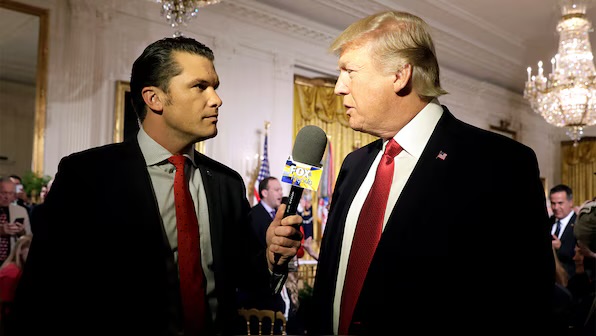Trump’s Unusual Choice
In a move that has caught many by surprise, President-elect Donald Trump chose Pete Hegseth, a well-known Fox News host, as the next defense secretary. This decision has generated significant attention and concern, especially at the Pentagon. Hegseth, known for his strong opinions on military culture, is a prominent critic of policies he describes as “woke.” His selection has raised questions about his qualifications and how he will approach the complex issues facing the U.S. military.
Hegseth’s Military Background and Views
While Hegseth has military experience, his service differs from the typical background seen in past defense secretaries. He served in Iraq and Afghanistan but in lower-ranking roles, where he followed orders rather than crafting military strategies. His recent work includes writing and speaking about what he sees as cultural issues within the military. Many observers are questioning if this experience will translate into effective leadership at the highest level of the Department of Defense.
Non-Military Defense Secretary : A Long Tradition
Although Hegseth’s appointment may seem unconventional, many defense secretaries in U.S. history have come from non-military backgrounds. The first U.S. Secretary of Defense, James Forrestal, appointed in 1947, had no formal military experience. Instead, he came from a career in finance as a Wall Street banker. Forrestal played a major role in setting up the Department of Defense and promoting a unified command structure. This shows that civilian defense leaders have a long-standing history in shaping U.S. military policy.
How Business Leaders Have Led Defense
Several past defense secretaries have brought skills from the business world. Robert McNamara, appointed in the 1960s, was previously president of Ford Motor Company. Though not a military man, McNamara’s business skills helped him bring a focus on data and efficiency to defense planning. His corporate perspective influenced nuclear policy and played a part in decisions during the Vietnam War. Business leaders like McNamara show that defense secretaries can be effective by using skills from outside the military.
Lawyers and Policy Experts Taking the Helm of Defence Secretary
Others with legal or policy backgrounds have also served as defense secretaries. In 1973, Elliot Richardson, who had experience in law and public service, took on the role briefly. Although he had no military background, he pushed for transparency and efficiency within the Department of Defense. Similarly, James Schlesinger, a Harvard economist, held the position from 1973 to 1975. Despite lacking military training, Schlesinger emphasised strong nuclear policies during the Cold War.
The Rise of Science and Technology Experts in Defense
In the 1970s, scientific experts started playing significant roles in defense leadership. President Jimmy Carter’s defense secretary, Harold Brown, was a physicist focused on keeping the U.S. technologically advanced. His emphasis on cutting-edge research in nuclear arms control aimed to maintain the U.S.’s competitive edge. The trend of appointing science and technology experts continued with Ashton Carter, who served from 2015 to 2017. Carter, though not from the military, promoted inclusivity and modernized the military with a focus on new technology and social equality.
Budget Experts Steering Defense Goals
Defense budgets are crucial, and budget experts have occasionally been defense leaders. Caspar Weinberger, who served under President Ronald Reagan, came with a strong background in budgeting. Weinberger promoted a major military buildup during the Cold War to counter the Soviet Union. His experience helped him navigate complex budget requirements and support initiatives like the Strategic Defense Initiative.
Intelligence Chiefs and Counterterrorism Experts in the Role
In recent years, some defense secretaries have come from intelligence backgrounds, focusing on anti-terrorism. Leon Panetta, who served from 2011 to 2013, previously led the CIA and had been a White House Chief of Staff. Although Panetta lacked military experience, he used his intelligence background to prioritize counter-terrorism. His leadership included the mission to capture Osama bin Laden, a major milestone in U.S. counter-terrorism efforts.
Modernising and Adapting the Military in the Trump Era
President Trump’s first defense secretary, Mark Esper, had previously served as an Army officer but spent much of his career in defense industry roles. He focused on modernizing the U.S. military due to rising tensions with China, shifting attention towards “great power” competition. Esper’s tenure highlighted how changing global challenges require evolving defense strategies.
Civilians Shaping U.S. Defense Policy
The U.S. has a tradition of civilian-led military oversight. Civilian defense secretaries bring unique perspectives and often push for policies shaped by their backgrounds. This tradition highlights the U.S. principle of civilian control over the armed forces. Each defense secretary’s approach reflects their era, from business-focused efficiency to counter-terrorism and technological innovation.
Looking Ahead: What Hegseth Might Bring As a Defense Secretary
As Pete Hegseth prepares to assume his new role, the Pentagon and defense community are watching closely. His unique background as a media figure and outspoken critic of military culture makes him an unusual choice. His service and strong opinions may lead to new approaches in defense. Observers await to see if his leadership will emphasise cultural changes or follow past secretaries who brought new ideas from non-military fields.
Trump selecting Hegseth may seem unconventional, but it aligns with the tradition of appointing civilians to oversee the U.S. military. These leaders often bring fresh ideas, focusing on adapting the military to modern needs. As Hegseth steps into this new role, his impact on defense policy could add another chapter to the unique history of civilian defense secretaries shaping America’s military future.

